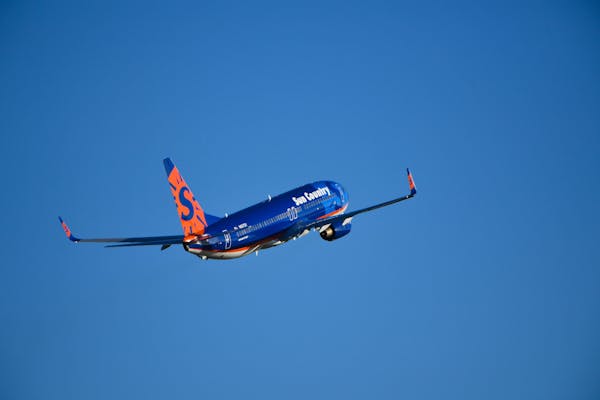The company that took over Sun Country's ground operations two months ago at Minneapolis-St. Paul International Airport didn't — or couldn't — hire workers fast enough, forcing the airline to send staffers from its Eagan headquarters to clean airplanes and check in passengers.
On Thursday, the airline said its contract with the company, Global Aviation Services, Inc., of Toronto, is ending, and it is resuming hiring people for the work itself, at least temporarily.
"The service level that has been provided at MSP is not up to our standard," Jessica Wheeler, a Sun Country spokeswoman, said. "It is not the customer-service level passengers deserve from us. We are going to do whatever we can to apologize, and hope that they'll be patient with us. We are committed to fixing it."
Sun Country laid off 350 ground service workers in May, including ticketing agents, gate agents and wheelchair assistants, after it had it hired Global Aviation Services in February to do such work. Sun Country also hired Global Aviation Services for baggage handling and airplane cleaning services, which it previously contracted to Swissport International Ltd.
For now, Sun Country is seeking workers that it will directly hire, train and pay to handle the groundwork at MSP, where it operates about 45 flights a day. The airline hopes to find another contractor to manage such work by fall.
Global Aviation terminated the contract with Sun Country at MSP three weeks ago, said the company's chief executive Carm Borg in an e-mail Thursday night.
"We gave them notice and asked them to find another ground handler," Borg wrote.
Since the changeover in May, staffing problems snowballed throughout the summer at the airline's gates and desk in MSP's Terminal 2.
Sun Country chief executive Jude Bricker personally asked headquarters' employees to volunteer at ticket counters or pick up trash between flights.
"As you are aware, we are undergoing significant challenges with our airport operations at MSP," Bricker wrote in a July 2 e-mail to employees. "Our vendor is experiencing staffing shortages and the resulting service issues are putting our brand and reputation at risk."
The airline's senior vice president of commercial, Brian Davis, told employees in a July 3 memo he planned to spend an upcoming weekend working at the airport. He also asked others to sign up for shifts that began as early as 4:30 a.m.
It's another hiccup since Bricker became chief executive last summer and the airline's sale to a New York-based investment firm by its previous owners, Minnesota businessmen and brothers Mitch and Marty Davis, over the winter.
The company also experienced PR trouble in April after some snowstorm-related flight cancellations left passengers stranded in Mexico.
Sun Country has been profitable in recent years but less so than other airlines in a prosperous period for the industry. Strategically, the airline has been caught between the service heft of far larger carriers such as Delta Air Lines, which dominates MSP, and the customer appeal of ultralow-cost carriers such as Spirit and Frontier. To boost profits and improve the airline's competitive position, Bricker and other new executives added some fees on passengers and started to expand Sun Country's routes and fleet.
The handover of work at MSP, its busiest airport, to a third party represented the biggest change to the day-to-day operation of Sun Country. Coming at a time when labor is in short supply in Minnesota, it was also a gamble.
"Every airline is facing this," said Mike Boyd, a Denver-based aviation consultant. "How do you do this kind of labor in a manner that is [financially] efficient?"
He said it's common for airlines to hire outside firms to handle personnel for groundwork that is considered less important than what happens in the air. But those third-party companies don't pay as much, and employee turnover is high.
"If you get hired by Global [Aviation] or someone else, your career path is only as long as the contract and then it gets bid again," Boyd said. "You aren't getting people who are staying there very long."
When the workers aren't guaranteed a job with that same airline, customer service can suffer, Boyd said. "There isn't a lot of incentive for them to make sure people want to fly the airline again," he said.
Most airlines, including the major carriers, have outsourced at least some of their ground services, particularly at airports where they have a lower traffic volume. United Airlines was heavily criticized when it outsourced 2,300 jobs between 2013 and 2015. Frontier Airlines outsourced its ground services — including at Denver, its hometown hub — in 2015, amounting to about a third of its total workforce.
The Sun Country contract was Global Aviation's largest ground-handling deal, the Canadian company said when it was announced a few months ago.
Kristen Leigh Painter • 612-673-4767
Electric cars and digital connectivity dominate at Beijing auto show
More than just a bowl of noodles, ramen in Japan is an experience and a tourist attraction
Stock market today: Asian benchmarks mostly slide as investors focus on earnings

